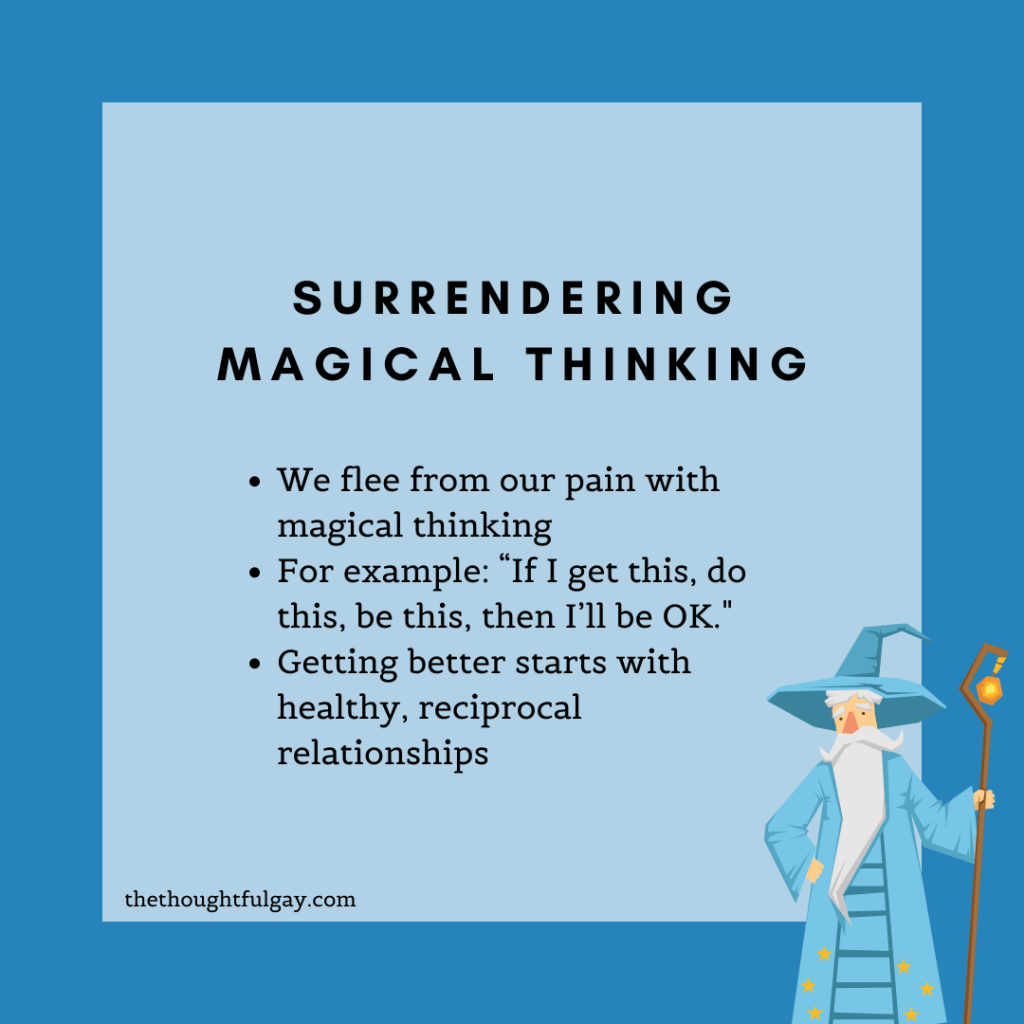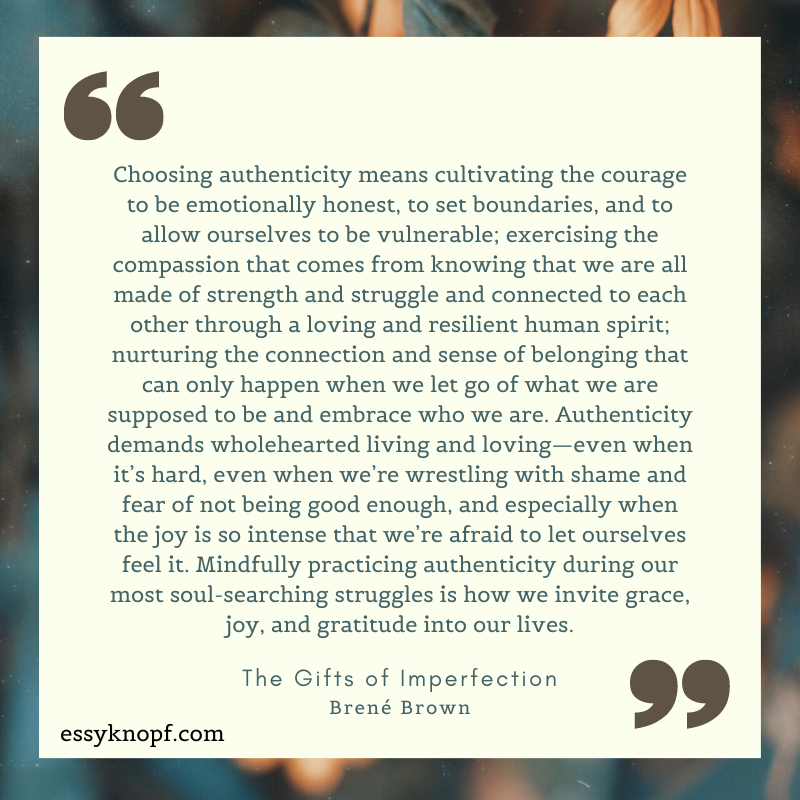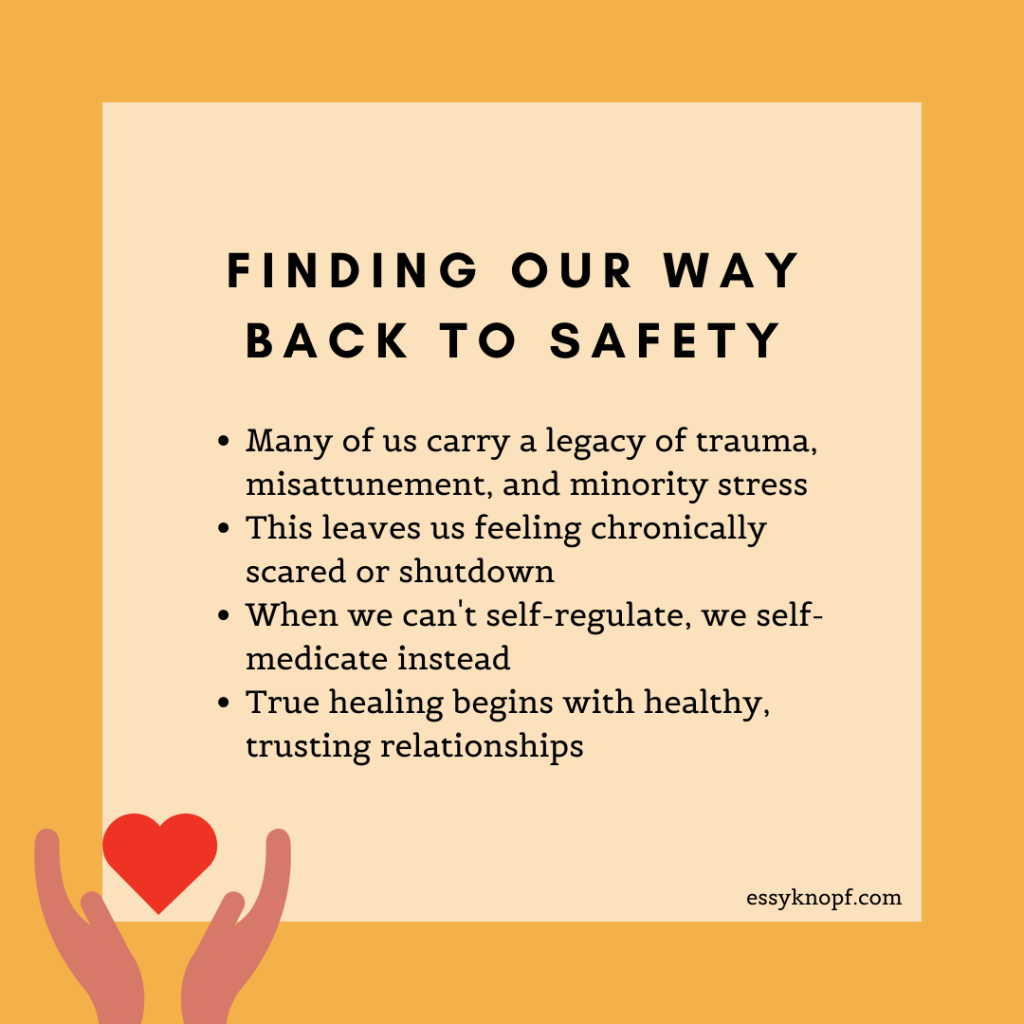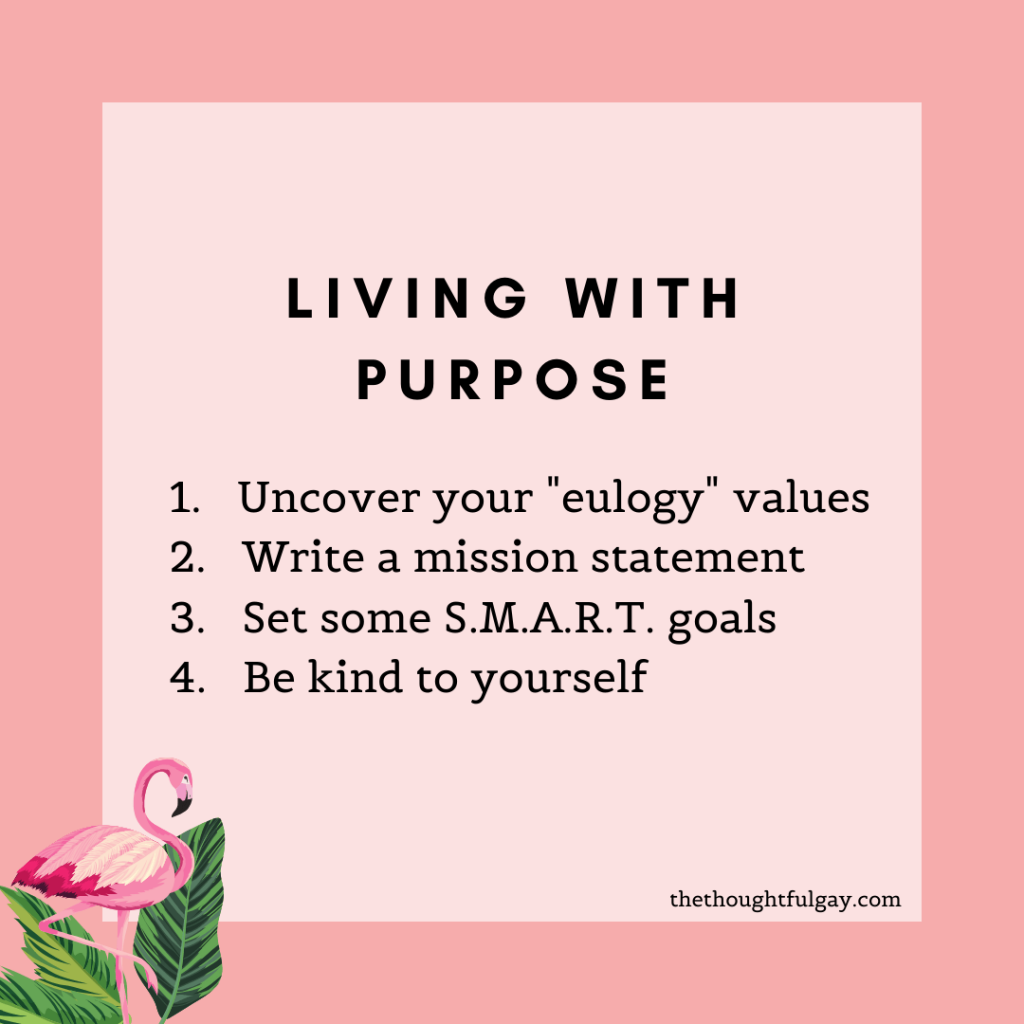How magical thinking destroys gay men’s chances of living authentically
Are you sitting down, dear reader? There’s something I need to tell you: almost everything we’ve been doing up to this point in the pursuit of happiness may very well have been undermining it.
Many aspects of the gay monoculture—the party lifestyle, substance abuse, hookups, out-of-control sexual habits, love addiction, our obsession with personal image, status, and achievement—are in some way tied up with magical thinking.
“If I get this, do this, be this, then I’ll be OK.” Wish-fulfillment keeps us walking the hedonic treadmill, riding an endless carousel of self-gratification.
Even supposing we achieve our goal, we may find the bar only continues to rise. So we clutch in vain for the brass ring of materialism, personal transformation, acceptance, recognition, and adoration.
Maybe all of this isn’t exactly news to you, and you have long since grown out of chasing elusive thrills. Or you may have simply upped the dosage and drowned out the hurt and disappointment.
The trauma of being gay
The first step on the way to surrendering the magical thinking that keeps us trapped in this cycle lies in identifying the causes.
As gay men, we can arrive at chronic suffering in a variety of ways. We may have also experienced misattunement with our caregivers, who may not have had the capacity to fully meet our emotional needs.
Or our caregivers may have invalidated us on the basis of our sexuality—an all-too-common experience for gay boys.
We may have experienced some form of childhood adversity. Some of us are even survivors of trauma.
Trauma includes abuse and neglect, but also any experience that places “an overwhelming demand placed upon the physiological human system”, to quote International Trauma Center President Dr. Robert D. Macy.
You may for example have been traumatized by individual acts of homophobia, or from the minority stress that results from its many systemic manifestations. Rejection, exclusion, marginalization, or physical harm for many can take a great toll.
If we are already lacking social support, such as the unconditional love and acceptance of family members or friends, the damage is only magnified.
For men, this is a fact of our existence. We are socialized from an early age to believe that in order to qualify for gender membership, we must strive for an impossible masculine ideal of self-reliance.
We do this by cutting ourselves off from our emotions, from the support of our mothers, and from our communities, a tragic development outlined in Terrence Real’s I Don’t Want to Talk About It.
We suffer even further from the absence of father figures and a lack of parental involvement. According to the Pew Research Center, one-in-four US fathers live apart from their children.
Twenty-nine percent of those same fathers see their children at least once a month, while 21% visit several times a year, and 27% don’t visit at all.
And according to the National Fatherhood Initiative, this absence carries a very real impact on children’s wellbeing.
Healthy, mutual relationships with primary caregivers are how we learn how to form nurturing attachments with others, maintain personal boundaries, regulate our emotions, and soothe ourselves in times of distress.
In this sense, our first relationships are the most defining, setting the stage for how we adapt—or maladapt—to our future circumstances.
When we are deprived of these crucial supports, we can develop an insecure attachment style, and struggle to develop the resilience so necessary to weathering life’s many storms.
A final but crucial source of trauma emerges from the relationships we engage in as adults. For those of us with difficult histories, we may turn to our partners for comfort and healing, only to find ourselves re-enacting toxic attachment patterns.
We may even lash out, inflicting the abandonment, abuse, or betrayal we ourselves have suffered. This only serves to compound our existing pain, driving us with increasing desperation towards escape and reprieve.

Becoming ‘masters of survival’
When we feel threatened, the system charged with ensuring our survival—the autonomic nervous system (ANS)—kicks into gear.
This “personal surveillance system”, Polyvagal Theory practitioner Deb Dana moves us many times daily between states of social engagement and connection (safety) to mobilization (scared), and immobilization (shut down).
These state changes are adaptive survival responses, driven by special powers of danger perception Polyvagal Theory author Stephen Porges calls “neuroception”.
Trauma survivors or those with insecure attachment styles may find their neuroception runs in overdrive, leaving them wary and hypervigilant. As a result, they may spend long periods stuck on the lower “scared” and “shut down” rungs of the “autonomic ladder”.
Our autonomic responses eventually become patterned not around the need for connection, but self-protection.
An out-of-whack autonomic response thus makes a state of safety next to impossible. With the ANS no longer able to adequately self-regulate, we suffer ongoing stress, physical illness, relationship strain, and changes in our mental functions.
While the ANS is activated, we are unable to socially engage, causing us to miss out in turn on the benefits of co-regulation—what Dana calls the “reciprocal regulation of our autonomic states”.
This co-regulation occurs when we connect and attune to others in healthy, mutual relationships. It is a key requisite to shifting from a state of danger, back into a state of safety.
“Supported by co-regulating relationships, we become resilient,” Dana writes.
“In relationships awash in experiences of misattunement, we become masters of survival.”
Given the collective trauma within the gay community, however, finding such co-regulation within may prove difficult.
In its absence, we will pursue less savory means of regulation such as objectification, exploitation, invalidation, and exclusion, which have reached new lows on gay dating services and hookup apps.

Deception, magical thinking, and self-medication
We survive through adaptation. When things go wrong early in life, however, we stand a great chance of maladapting instead.
Experiencing homophobia and resulting shame leads many of us into a life of emotional inauthenticity. Denied the ability to explore our own identities and to embark upon relationships during our formative years, we don a cloak of secrecy and self-deception as a matter of survival.
“Something about growing up gay forced us to learn how to hide ugly realities behind a finely crafted façade,” writes The Velvet Rage author Alan Downs.
Outwardly, we may proclaim self-acceptance. Inwardly, however, we are still carrying around unworthiness and internalized homophobia.
Its poisonous whisperings may lead us to reject other gay men arbitrarily, just as we ourselves were once rejected. Prejudices within the gay dating scene—be it racial, age or weight-based—are just a few expressions of this.
The deep, unexpressed pain we carry as trauma survivors, if left addressed, may eventually bubble back to the surface in the form of deep-seated anger.
That anger may be directed either at ourselves in the form of self-harming behaviors, or at the individuals or systems that we believe have failed, betrayed, and harmed us.
Without the knowledge or means to move forward, we ignore our wounds, numb the pain, and chase distraction.
We may find it in fantasies of personal transformation or romantic fulfillment. For those of us weaned on Disney—a company that built an empire on the power of dream—it’s all too easy to indulge in the idea of Cinderella-style transformations.
One day, we tell ourselves, we’ll shed our sooty smocks and don the glass slipper. Some dashing Prince Charming will appear and bestow upon us the fortunes of unconditional love and acceptance.
Our pursuit of such an embodiment of perfection of course is doomed from the outset. And yet we continue to plunge headlong into romantic liaison after liaison, without pausing to consider the whys and hows.
Denied co-regulation, we may also turn to self-medication in the form of process (behavioral) addictions, such as compulsively working out for hours on end so we can achieve some idealized physique.
Or it may take the form of substance addictions, which are present among gay men at significantly higher rates than the general population.
When we indulge in magical thinking, we try in vain to paper over the void at our core, believing that someway, somehow, our injuries will be healed and all wrongs righted.
But so long as we spend our energy cultivating distraction rather than introspection, our damage will go ignored and our very human need for healthy attachment and co-regulation unrecognized.

Letting go of the false solutions of magical thinking
Each of us understands on some level that magical thinking is an act of deception. We recognize that the forms of satiety we seek run counter to self-care.
And yet it is all too easy to get caught in the rut of trying to appease, ignore, or blunt our autonomic responses.
Try though we might to escape our dysregulation, all we are ultimately doing is deferring peace of mind.
Polyvagal Theory teaches us that in order to course-correct from scared and shutdown back to safety requires healthy relationships.
It is only through co-regulation that we can ever hope to loosen the hold misattunement and trauma have on our bodies, minds, and spirits.
If your autonomic state makes finding co-regulations difficult, or if you’ve been burned by past interactions, a relationship with a mental health professional can prove an effective substitute.
Through the support of a therapeutic alliance, open wounds both past and present may eventually start to close. Through a therapist’s supporting presence, autonomic regulation may suddenly become possible.
In recognizing and addressing your autonomic needs, you are taking the first step towards a life of authenticity. To quote Brené Brown:
cultivating the courage to be emotionally honest, to set boundaries, and to allow ourselves to be vulnerable; exercising the compassion that comes from knowing that we are all made of strength and struggle and connected to each other through a loving and resilient human spirit; nurturing the connection and sense of belonging that can only happen when we let go of what we are supposed to be and embrace who we are. Authenticity demands wholehearted living and loving—even when it’s hard, even when we’re wrestling with shame and fear of not being good enough, and especially when the joy is so intense that we’re afraid to let ourselves feel it. Mindfully practicing authenticity during our most soul-searching struggles is how we invite grace, joy, and gratitude into our lives.
By choosing authenticity, we surrender the false solutions of magical thinking. By choosing authenticity, we give up temporary rewards and commit ourselves to some much-needed repair.

Essy Knopf is a therapist who likes to explore what it means to be neurodivergent and queer. Subscribe to get all new posts sent directly to your inbox.




